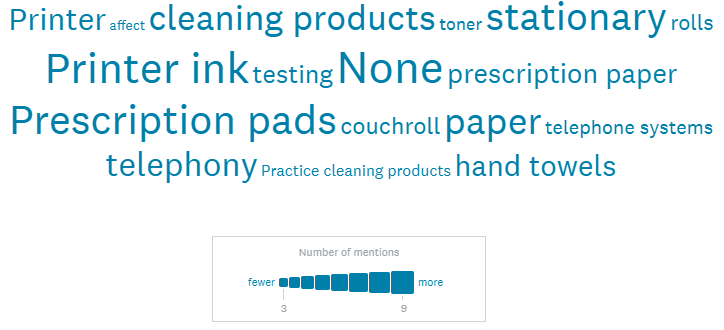EU Exit Planning: Non-Clinical Goods and Services
![]() Thank you for responding to our recent survey on practice needs in the event of a no-deal Brexit. We rely on your input.
Thank you for responding to our recent survey on practice needs in the event of a no-deal Brexit. We rely on your input.
Following a discussion at our Annual General Meeting on Thursday 24 January, we asked you about the impact of a no-deal EU exit on your practice-critical Non-Clinical Goods and Services (NCGS). Medical devices, clinical consumables and medicines are being considered separately.
We asked you to consider:
- The dependency of those goods/ services on that front-line service;
- The criticality of that front-line service and its clinical importance; and
- Outsourced services such as equipment maintenance.
We had a really good response and have been able to advise officials about supply concerns across London in good time. Whilst there were a number of respondents who are unconcerned about the impact of no-deal Brexit, those who do harbour concerns highlighted a number of non clinical products and services which they fear might be affected. These include:
- Stationary;
- Printer ink;
- Prescription pads;
- Couch roll;
- Paper;
- Telephony;
- Cleaning products;
- Prescription paper;
- Printer;
- Hand towels;
- Testing;
- Telephone systems;
- Practice cleaning products; and
- Toner.
We will continue to work with officials to identify and anticipate the impact of Brexit on London general practice, be it no-deal or otherwise. Other possible EU exit risks include:
- Goods or services that have supply chain touch points in the EU;
- Personal data held in EU member countries;
- Supply routes into the UK via Dover/ Calais; and
- Dependencies on EU regulations.
If you have any comments or questions about this work, please contact us.
This word cloud gives some indication of respondents' concerns.

LEAD events round-up July 2017 (22 Aug 2017)
July was a busy month for the LEAD Programme. We hosted four events reaching out to different target audiences in General Practice. An Essential Survival Kit for new GPs was...How to respond to school sickness absence requests (22 Aug 2017)
Dr Elliott Singer, Medical Director lead for our GP State of Emergency campaign, explains how to push back against requests for school sickness absence letters in order to free up...New resource to explain how Londonwide LMCs supports everyone working in general practice (22 Aug 2017)
Why the GP Patient Survey matters (22 Aug 2017)
Dr Julie Sharman, Medical Director with our GP and Practice Support Team, explains why practices should care about the GP Patient Survey and what actions they should take to follow-up...Data security and the General Data Protection Regulations (GDPR) - get ready now! (22 Aug 2017)
Earlier this month that the Government announced that the forthcoming European privacy rules set out in the General Data Protection Regulation (GDPR) will come into British law and update the...Extended hours DES and cyber attack (21 Aug 2017)
Following the cyber-attack on NHS computer systems in May a number of practices nationally were told by commissioners that they needed to make up the opening hours lost during the...Waiting room video – what to do when you are referred to a specialist (21 Aug 2017)
Our new waiting room video is designed to inform patients what they can expect when they are referred to a specialist or therapist. The video includes information on tests and...NHS England asking practices to complete its records on possible patient harm due to correspondence lost by Shared Business Services. (21 Aug 2017)
NHS England are say 30% of practices in England have yet to respond to their request to provide details of whether any patients may have come to harm due to...CQC registration fees reimbursement scheme claim process (20 Jul 2017)
The GMS contract changes for 2017/18 includes full reimbursement of Care Quality Commission (CQC) registration fees. This change is being implemented via the Statement of Financial Entitlements (SFE) which means...Londonwide LMCs' July 2017 newsletter (19 Jul 2017)
...Guidance
We provide expert guidance for practices in our guidance section, as well as an archive of other materials you may find useful.
GP Support
Contact our GP Support team if you need help or advice.
The team provide professional and pastoral support to GPs and practice teams on a broad range of issues.

